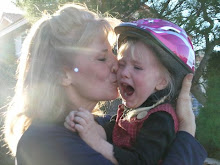Poppies On Memorial Day

(Story copied from http://www.cal-mum.com/poppy.htm)
In 1918 Miss Moina Michael was teaching at the University of Georgia, in the town of Athens, USA. Having volunteered for war work with the YMCA she was called up for service with the Overseas YMCA War Workers. In September 1918 she took leave of absence from her post at the university and arrived at the YMCA training headquarters at Columbia University, New York City, where she had originally been a student in 1912-1913.
After completing her training course Moina's hopes of being sent abroad were dashed when she was barred from overseas service due to her age - she was 49. However, Dr J W Gaines, president of the Overseas YMCA Secretaries, helped Moina stay with the organization by giving her a job at the training headquarters where she worked until January 1919.
The idea for the Flanders Fields Memorial Poppy came to Moina Michael while she was working at the YMCA Overseas War Secretaries' headquarters on a Saturday morning in November 1918, two days before the Armistice was declared at 11 o'clock on 11 November.
The Twenty-fifth Conference of the Overseas YMCA War Secretaries was in progress. On passing her desk, a young soldier left a copy of the November Ladies Home Journal on Moina's desk.
At about 10.30am, when everyone was on duty elsewhere, Moina found a few moments to read the magazine. In it she came across a page which carried a vivid color illustration for the poem "We Shall Not Sleep" (later named "In Flanders Fields") by the Canadian Army doctor John McCrae.
Reading the poem on this occasion - she had read it many times before - Moina was transfixed by the last verse - "To you from failing hands we throw the Torch; be yours to hold it high. If ye break faith with us who die, we shall not sleep, though poppies grow in Flanders Fields."
In Moina Michael's book 'The Miracle Flower' she described the experience as deeply spiritual, and she felt as though she was actually being called in person by the voices which had been silenced by death.
At that moment Moina Michael made a personal pledge to 'keep the faith' and vowed always to wear a red poppy of Flanders Fields as a sign of remembrance and as an emblem for "keeping the faith with all who died".
Compelled to make a note of this pledge she hastily scribbled down a response on the back of a used envelope, entitled "We Shall Keep the Faith".
On the morning of Saturday 9 November 1918 three men from the Twenty-fifth Conference of the YMCA Overseas Secretaries appeared at Moina Michael's desk. On behalf of the delegates they asked her to accept a check for $10 in appreciation of her efforts to brighten up the headquarters with flowers.
She was touched by the gesture and replied that she would buy twenty-five red poppies with the money. She showed them the illustration for John McCrae's poem "In Flanders Fields" in the Ladies Journal, together with her poem "We Shall Keep the Faith", which she had written in reply. The delegates took both poems back into the Conference.
After searching the shops for some time that day Moina found one large and twenty-four small artificial red silk poppies in Wanamaker's store. When she returned to duty at the YMCA Headquarters later that evening delegates from the Conference crowded round her asking for poppies to wear. Keeping one poppy for her coat collar she gave out the rest of the poppies to the enthusiastic delegates.
According to Moina, since this was the first group-effort asking for poppies to wear in memory of "all who died in Flanders Fields", and since this group had given her the money with which to buy them, she considered that she had consummated the first sale of the Flanders Fields Memorial Poppy on 9 November 1918.
During the winter of 1918 Moina Michael continued working for the Staff of the Overseas YMCA Secretaries. She visited wounded and sick men from Georgia who were in nine of the debarkation hospitals in and around New York City, to find what could be done for them other than what the hospitals were doing.
By March 1919 she had moved back to Georgia to take up her place at the University of Georgia. With the return of thousands of ex-servicemen from that time Moina realized that there was not only a need to honor the memory of those who had died in the service of their country, but also a need to remember that those who were returning also had mental, physical and spiritual needs.
During the summer months of 1919 Moina taught a class of disabled servicemen, there being several hundred in rehabilitation at the University of Georgia. Learning about their needs at first hand gave her the impetus to widen the scope of the Poppy idea, to develop it so that it could be used to help all servicemen who needed help for themselves and for their dependents.
In September 1921 delegates at the Auxiliary to the American Legion Convention agreed that disabled American war veterans could make the poppies sold in the United States, thus generating much needed income for veterans who had no other income. The Auxiliary provided all the material and had it pre-cut for forming into flowers.

